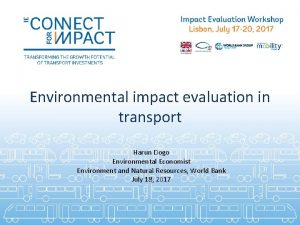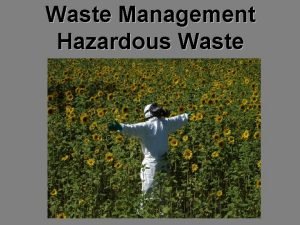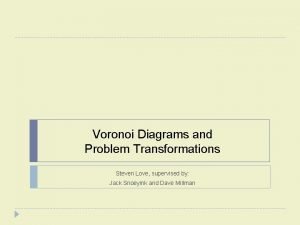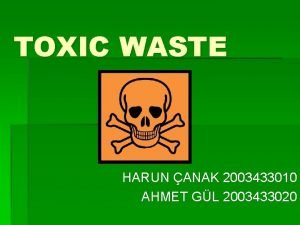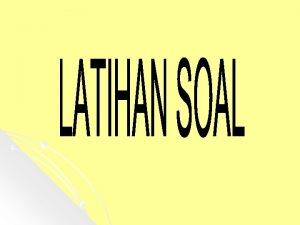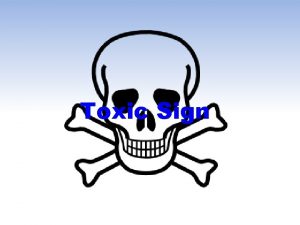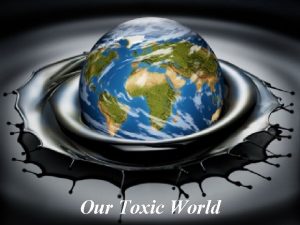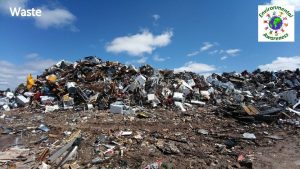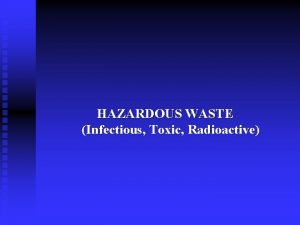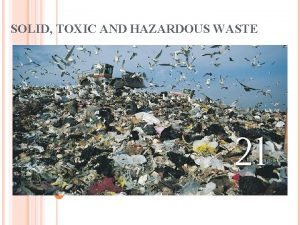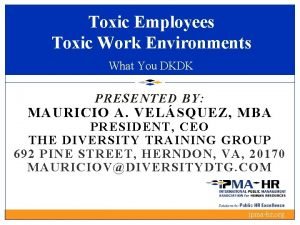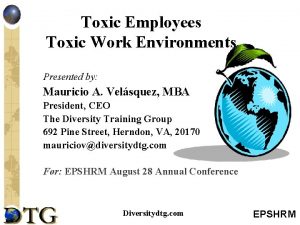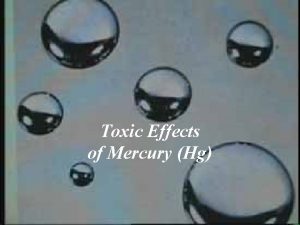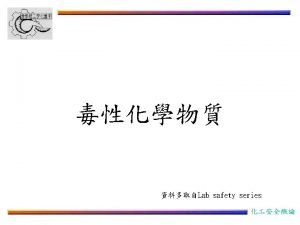TOXIC WASTE HARUN ANAK 2003433010 AHMET GL 2003433020
















- Slides: 16

TOXIC WASTE HARUN ÇANAK 2003433010 AHMET GÜL 2003433020

OUTLINE § INTRODUCTION § Definition of Toxic Waste § Effects of Toxic Waste against Environment and Human Beings § CAUSES OF TOXİC WASTE § Sources of Toxic Waste § Economic Causes of Toxic Waste as an Externality § TREATMENT AND REGULATIONS § § Treatment Policies of the Waste Economic Implications of Treatment Regulations and Institutions Stance in Turkey § CONCLUSION

TOXIC WASTE § Toxic (hazardous) waste is a waste which make it dangerous or potentially harmful to human health or the environment. because of its quantity, concentration, physical, chemical or infectious characteristics. § Toxic wastes can be liquids, solids, contained gases, or sludges. § US Enviromental Protection Agency (EPA) listed the toxic waste into three categories: § The F-list: non-specific source wastes § The K-list: source-specific wastes § The P-list and the U-list: discarded commercial chemical products.

Source: “Environmental Protection”, www. ibm. com

Effects of Toxic Waste § Toxic wastes are harmful to human health or to the environment, either immediately or over an extended period of time. Toxic waste may § cause, or significantly contribute to an increase in mortality (death) or an increase in serious irreversible, or incapacitating reversible illness; § pose a substantial present or potential hazard to human health or the environment when improperly treated, stored, transported, or disposed of, or otherwise managed.

Toxic Waste as an Economic Externality § Toxic waste is resulted from industrial, commercial, mining, and agricultural operations, and from community activities. § As the economic cause, small businesses such as metal finishers, gas stations, auto repair shops, dry cleaners, and photo developers produce many toxic waste products. § Some hazardous waste generators are larger companies like chemical manufacturers, eletroplating companies, and oil refineries.

Treatment Policies § In Toxic Waste Treatment there are two major options for getting rid of those wastes: § Incinerators § Disposal Sites § These two options are like a double-edged sword because none of them has gave a superiority on toxic waste treatment.

Incinerators § Incinerators are the facilities for burning and destructing toxic wastes. § Today many of these facilities are located in first world countries. § Incinerators are not fully form a solution for toxic wastes. § For some special and fatal wastes incinerators can be useless. § Furthermore many countries do not want to possess and annihilate those types of wastes. But chemical enterprises can produce dangerous chemicals and under illegal ways they try to get rid of those wastes.

Disposal Sites § They are also called as contamination areas. § Toxic wastes are preserved in these areas for natural recycle. § But not all of the toxic wastes belong to nature or can be easily annihilated by itself. § In contamination areas there must be security measures for trespassing of peoples and other living creatures. § On the other hand soil itself may drain liquid wastes deeper parts of the earth. § This can cause poisoning of groundwater

Economic Implications § As mentioned before two types of destruction of toxic wastes are not sufficient for clean nature. § First Incinerators and burning of wastes in those facilities are very expensive and needs proficiency. § Not all of the countries in the world have the capability to own those facilities. § Secondly producing chemicals are more easier than to annihilate them. So many of the enterprises try to dump their wastes into contamination areas. § Highly urbanized first world countries have not sufficient empty lands to dump their wastes. § Because of this many of the toxic wastes today dumped into third world countries’ soils in unsuitable conditions.


Regulations and Institutions § Regulations and Institutions are not sufficient for efficient control over the toxic waste activities. § On global and national levels many of the countries have some serious problems. § Today Civil Society institutions like Greenpeace make great efforts to clean the nature from chemicals. § In United States there were some crucial organizations for controlling toxic waste pollution like Environment Protection Agency and its sub-divisions for protecting people and nature from being harmed by toxics. § But in third world countries there are no common regulations and supervision over toxic wastes.

§ The Basel Convention on the Control of Transboundary Movements of Hazardous Wastes and their Disposal is the most comprehensive global environmental agreement on hazardous and other wastes. § It came in to force in 1992. § It has over 160 Parties and aims to protect human health and the environment against the adverse effects of generation, management, trade and disposal of toxic wastes. § Basel Action Network try to monitor and regulate toxic waste flow but even countries which are democratic and respectful to human rights transgress international law and norms. § United Nations tried to be more active on this issue but there is still way to achieve any considerable solution.

Stance in Turkey § Turkey as many cases in international politics and technical issues want to play a subordinate role in toxic waste problem. § Turkey signed Basel Convention and declared that trade of toxic wastes are not permitted. § TAEK (Turkish Atomic Energy Authority) was the first institution to have the legal obligation to control wastes. § On the other hand universities and municipalities are also liabilities in this issue.

Ship of Ulla § Ulla, under Spanish flag, with its full of toxic waste rejected by Algeria and in a mystery came to Mersin in 2000. § Greenpeace and other NGOs force Ulla to came into the nation’s agenda. § Experts from METU find Ulla’s cargos highly dangerous and sealed the whole ship. § That caused a 4 years of corrosion of the ship. § Until sinking of the ship in Iskenderun Harbor Turkish and Spanish governments look forwards to each others’ acts. § In the end of this four years nothing done and with two thousands of wastes ship went down into waters of Mediterranean Sea.

Conclusion § Annihilation of toxic wastes are very expensive and inefficient for clean environment. § Development at all costs is very dangerous for future so sustainable developments must be taken into account. § Third world countries are suffering most from toxic waste problem. § According to specialists the only way to save the world from toxic wastes is the “Clean Production”. § Clean Production suggests a system of preventing production process without exposing toxic wastes.
 Common law
Common law Harun dogo
Harun dogo Example of hazardous waste
Example of hazardous waste Toxic waste dump problem voronoi
Toxic waste dump problem voronoi Toxic waste causes
Toxic waste causes Dari 60 orang siswa ternyata 36 orang gemar membaca
Dari 60 orang siswa ternyata 36 orang gemar membaca Konseling relasi anak anak
Konseling relasi anak anak Puisi lama dari india adalah
Puisi lama dari india adalah Mengapa anak anak menjadi sasaran utama pendidikan
Mengapa anak anak menjadi sasaran utama pendidikan Perhatikan gambar disamping yang bukan anggota k adalah
Perhatikan gambar disamping yang bukan anggota k adalah Parco naturale puez odle
Parco naturale puez odle Peranan anak lelaki dan anak perempuan
Peranan anak lelaki dan anak perempuan Perhatikan gambar disamping yang bukan anggota k adalah
Perhatikan gambar disamping yang bukan anggota k adalah Cabaran ibu bapa dalam mendidik anak anak pdf
Cabaran ibu bapa dalam mendidik anak anak pdf Dari 40 orang anak ternyata 24 anak gemar minum teh
Dari 40 orang anak ternyata 24 anak gemar minum teh Nenek membagikan uang rp960.000 kepada 12 orang cucunya
Nenek membagikan uang rp960.000 kepada 12 orang cucunya Dari 40 orang anak ternyata 24 anak gemar minum teh
Dari 40 orang anak ternyata 24 anak gemar minum teh

